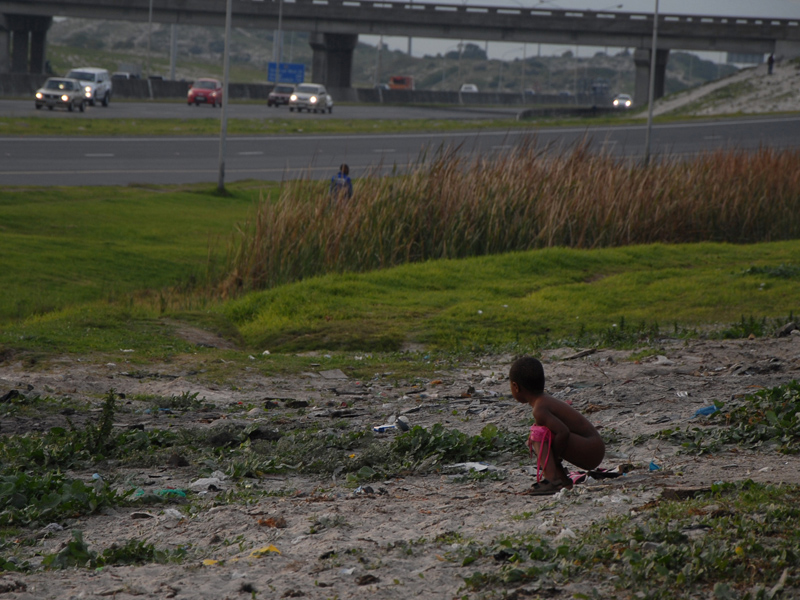Toilet Wars
 | ||||||||
| Figure 1: A child defecates along a motorway (Masixole Feni, 2016)
The ‘Toilet wars’ were a direct result of the infringement on sanitation-based human rights (Robins, 2014). During 2010, in Khayelitsha, 51 toilets were destroyed by the ANCYL. They reasoned as the toilets were insufficiently enclosed and located in a public space (re figure 3), their use was undignified (Ntliziywana and Ayele, 2010). This inverted spatiality of what should be private prohibited a fundamental requirement for inclusion in civil society. The ANCYL’s destruction of these toilets can therefore be seen as a claim to citizenship (Jackson and Robbins, 2018). This was a public challenge to the DA’s transfer of responsibility of producing sufficient enclosures and sanitation infrastructure onto the user. Here, the toilet symbolizes the failure of the state.
In contrast, affluent areas are more embedded within the city’s sanitation
network where flushing toilets allow users to 'flush and forget' (Penner, 2010). This difference in user responsibility became formalised when the
eThekwini Water stated that sewage networks wouldn’t be extended to the peripheries due
to economic restraints (Sutherland et
al, 2014). The explicit division between servicing of core and peripheral areas reflects
the inequity of access along these spatial and socio-economic boundaries (Jewitt, 2011). In other protests, protestors led by the ANC smeared the entrance to the provincial parliament with faeces (figure 4). Sanitation activism has a common theme of imposing the inhumane realities of those on the peripheries onto those in the ‘clean’ privileged centre. In doing so, they force policymakers to recognise and address the lived sanitary realities of those invisible to the state (McFarlane and Silver 2016). Sanitation therefore becomes an arena for representation, where marginalised groups can make claims for human rights.
building (CatalystJourn)
Alternatively, the SJC engage in ‘mobilisation from below’, implementing digital mapping, and enumeration to improve sanitation legibility for more effective lobbying (Overy 2013). Given urbanization and population expansion's projected growth, the Toilet wars are here to stay. As opposed to criminalizing activists, policymakers must look towards creating policies to prevent further materialisation of sanitation inequality. |




Very interesting post! Linking the issue of sanitation with politics through this case study is a great idea.
ReplyDeleteHi Antoine, thank you for your comment. I thought given sanitation is a more unorthodox talking point within water discourses, the toilet wars served as an interesting example!
Delete